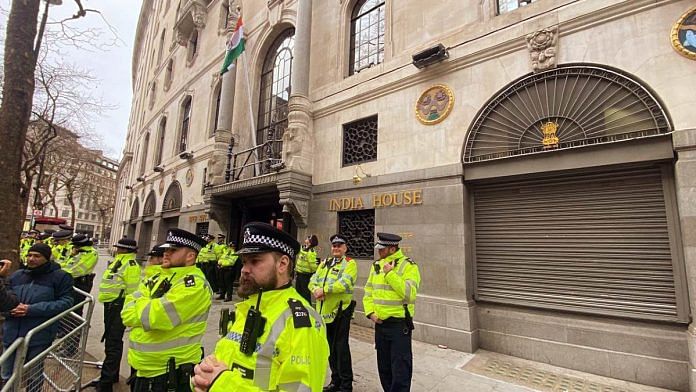New Delhi: UK officials will interact with experts in Delhi this week to understand how Sikh extremism has evolved over the years, ThePrint has learnt.
The development comes amid weeks of diplomatic strains between the two countries over the Khalistan issue, which is believed to find active support from a section of the Indian diaspora.
Tensions erupted on 19 March, when pro-Khalistan protesters demonstrating outside the Indian High Commission in London pulled down the Indian flag. The protest was held in support of Sikh extremist Amritpal Singh, who has been on the run in India.
At the 5th India-UK Home Affairs Dialogue in Delhi Wednesday, India asked the UK to crack down on pro-Khalistani extremists exploiting asylum laws to abet terrorism in India. Permanent Secretary at the UK Home Office, Matthew Rycroft, and Union Home Secretary Ajay Kumar Bhalla presided over the dialogue.
According to experts ThePrint spoke to, developments such as the British officials’ visit could possibly be viewed as the UK’s attempt at “damage control”, but might as well just be optics.
After the high commission incident, India lodged a “strong protest” with the UK government and questioned the absence of security at the mission in London. Security was also scaled down outside the house of UK High Commissioner Alex Ellis in Delhi.
Earlier this week, a report by British newspaper The Times claimed that India has “disengaged” from free trade agreement (FTA) talks with the UK over the Khalistan issue. The FTA, which saw its Diwali deadline lapse last year, has seen many delays.
However, the Indian government and the UK mission in Delhi have denied such reports, adding that both sides remain “committed” to wrapping up a trade deal.
Advancing cooperation on agenda
During the meeting between Rycroft and Bhalla, the two sides discussed advancing cooperation in counterterrorism, extradition and anti-India activities in the UK, including pro-Khalistan extremism.
Ruchi Ghanashyam, former high commissioner to the UK, told ThePrint that it “is good optics for the UK representative to have come to Delhi and for expert interactions on Sikh extremism to take place”.
“But it’s not just optics, we need action. For example, what kind of enhanced security measures have been put in place for the Indian mission in London to ensure such incidents are not repeated?”
According to former foreign secretary Kanwal Sibal, Rycroft’s visit and UK officials’ upcoming interaction with experts can be seen as an attempt at “damage control” only if there is a belief that recent developments have “seriously damaged” bilateral ties.
“If there is genuine recognition on the UK side that the freedom they gave to Khalistani elements in the UK to campaign against India’s sovereignty and territorial integrity is seriously damaging ties, then, yes, his visit could be characterised as damage control,” Sibal told ThePrint.
However, he added that this could be a case of London trying to “temporise” the issue, given that the separatist Sikh lobby has “strong political links” in the UK establishment.
“Yielding to India will open them [UK] to pressure on other issues, including extradition,” he added.
Ummu Salma Bava, professor and Jean Monnet Chair at Jawaharlal Nehru University’s Centre for European Studies, said that it is likely Rycroft’s visit is an attempt to iron out “irritants” in the bilateral relationship.
“I presume this visit by the permanent secretary at the UK Home Office will seek to address any irritants in the relations and offer the opportunity to restore trust in the bilateral partnership, especially with major events like the G20 Summit coming up,” Bava told ThePrint.
“Meeting the expert community in Delhi will also be key in helping the UK side understand the role of the diaspora in the Khalistan movement, which is a matter of national security for India,” she added.
This is a revised version of the report
(Edited by Smriti Sinha)
Also read: Closely watching PM Modi’s comments, NSA Ajit Doval should visit Kyiv: Ukrainian minister



